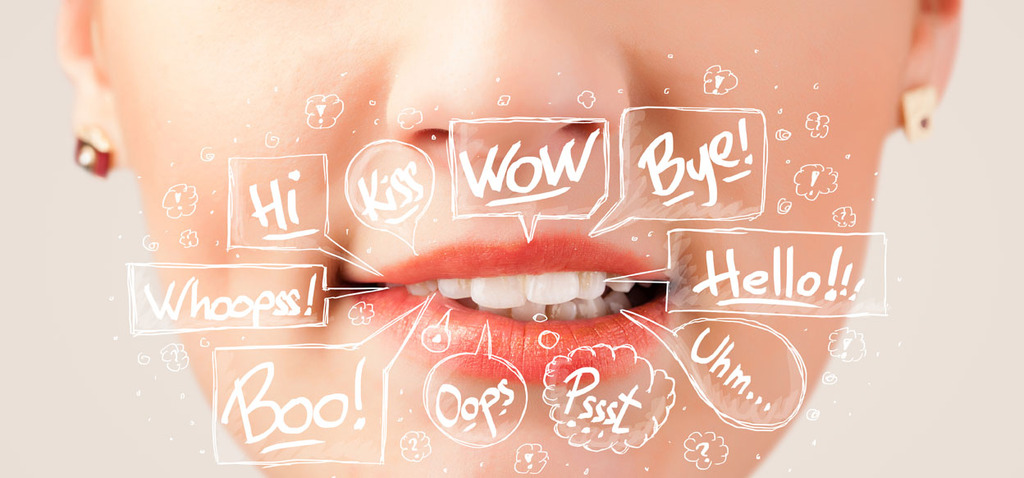Few weeks back, I was having a conversation with a dealer when he asked for my contact number. I told him to put down my husband’s contact as I am deaf. He looked astonished and exclaimed that I was speaking perfectly fine, using a handphone and I could hear him well.
Why does he think that deaf people cannot use a phone? There is other functions like SMS and WhatsApp isn’t it?
I explained that I lip read all these while. He was stunned, “You can READ MY LIPS?” And he mouthed silently, “CAN YOU HEAR ME?”
There it goes again, I get this reaction all the time just because I speak well and some people refused to believe that I am hard of hearing. Trying not to sigh, I nodded and said, “Yes, I cannot hear you.”
How am I suppose to hear you when you are not making a sound?
* * *
Flashback to many years ago when I was pretty young, I remembered sitting in the room surrounded by vibrant-looking reading cards and colourful toys. As a child, one would feel excited being in a room like that. But no, I was pretty tensed and wide eyed, trying to focus on every word that my speech therapist said. Frowning at her lips as she made some exaggerated lip movements, my brain was trying to connect every movement with the sounds she made. But no matter how many times I have tried, my speech therapist would patiently shake her head and said, “No, I cannot hear your consonant. You should make S like hissing the air between your teeth…Ssssss.” She attempted to teach me how to place my tongue and formed lip shape to make the correct sound. But I cannot hear the ‘S’ sound that she was making, and I am clueless of how to create a sound like that.
Welcome to my silent world
I am born deaf. I think my hearing parents made a realisation that their 4-year-old daughter was deaf when I did not respond to them most of the time. My memory is pretty vague but I think it was when I was five years old, I was fitted with a pair of big and ugly hearing aids. I would always recoiled back into my shell whenever people noticed them and started asking. I refused to speak to strangers, and I was pretty quiet in class. I always thought to myself, “I shouldn’t make any sound. I speak funny and everyone will find me weird.”. Believe me or not, I could not even pronounce my name properly until I was in secondary school!
Instead of “Esther”, I would say “Ether”. Then I will end up making a S sign while saying “Ether”.
My classmates would giggle, and strangers will always asked, “Do you have short tongue? You speak really funny.” No, I don’t have short tongue. The reason why I speak like I have a short tongue is due to my hearing.
Back then, hearing aids are all mainly analog, which does not have any advanced features for improving voice clarity. So fitting with a pair of analog hearing aids, it helps to amplify the sounds but it does not increase the speech clarity. People cannot understand that wearing hearing aids does not mean that I can hear well enough to understand full conversation. I can hear you loud enough, but I cannot understand you enough. Does that make sense to you?
For a normal hearing person, I assume that you can understand the whole conversation since the hearing of the high to low frequencies is in the normal range. But for a hearing-impaired person, various degrees of hearing is lost. In my case, I cannot hear high frequency words which involved consonants like “S” and “T”. These consonants are usually the ones that make speech understandable.
For this sentence: “Today, she is going to the market to buy some fish.”
What I hear was: “_oday,_he i_ going _o _he marke_ _o buy _ome _ish.”It sounds gibberish right?
A very vivid memory came to my mind. I was seven years old. One day, I bumped into my primary school principal as I was walking back to class. As like what we students have to do, I bowed and greeted her, “Good afternoon, Mr_ Voo.”(Her name is Mrs Foo). Before I can run off, she stopped me and said I pronounced her name wrongly. That was the moment I always dread, she proceeded in teaching me how to pronounce the “S” and “F” correctly. Unfortunately, as much as my hearing aids tried to pick up, no matter how much I tried, I still cannot pick it up.
Learning how to read lips

It’s written on your face. Credits: Shutterstock
Because of speech therapy, I began to learn to read lips as visual aid to complement my loss of hearing. But reading lips alone does not give me 100% understanding of what it was being said, maybe about 30% to 40% of it. The rest of the time was trying to fill in the blanks, and observing facial expressions and body language to figure out what the person says. Sometimes, I get it right, but sometimes, I will get frowns and confused looks.
Like for instance, a classmate asked me from far and I could not hear her at all. So I focused on her lips and this is what I read, “Where is _h__ex_book, can you __nd it-_?”
My brain tried to find the missing words based on the situation and I thought she was probably asking, “Where is the textbook, can you lend it to me?” I said okay. She frowned and with a sinking heart, I realised I misread wrongly and asked to repeat again. She said louder this time. “Where is your textbook? Can you find it?” I replied in a hurry, “Yes, I’m sorry, I couldn’t hear you just now.” She smiled back in understanding.
But most of the time, when I am face to face with a person or near enough for me to hear a little, it makes lipreading so much easier without having to rely so much on my hearing which make conversation flows smoothly. As I read the lips, the sounds which is gibberish to me became instantly legible. It is pretty useful when my mother yelled at me, and I would casually switch off my hearing aids and simply read her lips. It makes her so MAD all the time!
People think I am like those spies in movies where they can understand private conversations from far and I will get amused and shake my head. This is impossible and I shall explain why:
- First, they are too far for me to read their lips in full conversation and I am far-sighted by the way.
- Second, when you speak too fast or you mumble, I also cannot read your lips! I always tell my close friends and family not to mumble because I simply cannot understand them when my eyes cannot even see any lip movements. It is pretty frustrating when I am talking to people whom I am not close with, and they mumble and I always keep shouting at them in my head: “PLEASE OPEN YOUR MOUTH AND STOP MUMBLING!” Sadly, they cannot hear my silent voice and I ended up feeling exhausted with tired eyes and brain.
- Third, I cannot read strong accents. The lip movements is different so I am pretty lousy when comes to watching movies with strong american or chinese accents since I was not used to it.
- And last, too many people speaking at once, it is like watching multiple TV screens at once! I will not be able to focus full attention in a big group and I will eventually shut down and tune in those who are speaking nearest to me.
It is not like those spy movies where I can understand exactly what other people are saying from afar.
I saw this video “Can You Read My Lips” on National Geographical and I thought it is a great video to share. This video is the perfect example on explaining on what it is like to read lips:
Learning how to speak
When I was about six to seven years old, my aunt would home tutored me by recording her own voice reading aloud from children’s books that we always borrowed from the community library nearby every week. Each day, I will keep replaying her tapes, trying to focus on the words that I heard while reading the books. And then she will make me tell her the whole story at the end of it, correcting some of my pronunciations. Bless her, she made reading enjoyable so that’s how I learn to love reading. She even joined my school as a reading mum so that I would gain courage and attended reading mum sessions with her, and I would read aloud to other reading mums.
As I grow older, I started to understand that being an oralist is necessary to survive in the hearing world.
Because I cannot hear how it sounds like, I have to memorise the lip movement, teeth and tongue placement in order to pronounce each letter from A to Z.
In order to learn how to speak, thoughts run like this through my mind: Do I have to roll my tongue? Do I have to clench my teeth? Do I have to touch my tongue above when I pronounce this?
On my wedding day, speaking to hundreds of guests which I once thought was impossible, I managed to speak with ease and even laughed with the crowd. My family and husband were incredibly proud of me after spending days teaching me the proper pronunciations as they patiently went over my speech with me. I even manage to say my wedding speech in Hokkien dialect much to my grandparents’ delight!
But in reality, as I was saying my speech, I was so busy trying to remember where to place my tongue, when to produce “S”, “T” and “F” sounds and remembering the different tones while trying to make eye contact with the audience at the same time. It was really nerve-wrecking!
As technology get more advanced, I recently got myself a pair of digital hearing aids which has multiple frequency channels (my old analog hearing aids has only 2 channels) and my audiologist helps to adjust the amount of amplification in each channel to the best she can to allow me to have a better analysis of my sound environment.
Fast forward to the present, despite getting better at talking and lipreading, I will still make mistakes from time to time. Even now, I still cannot differentiate certain consonant sounds at primary high frequencies, and the speech will sound jumbled.
* * *
I thought writing this post will help many people to understand how our silent world is like.
We may sound weird because that’s what we thought we hear and you don’t have to speak very slow and loud as if we are slow-witted. We may be deaf but we are intelligent individuals. Speaking loudly does not help because, I can hear you but not the unvoiced consonants which are responsible for making the speech legible. You cannot increase the unvoiced consonants even if you speak louder.
We can be slow in response because we are trying to see if we hear and read you correctly, and at the same time, making sure that we reply back accurately enough for you to understand what we are saying. Sometimes, we have to repeat what you say to make sure we understand you well enough.
Just speak normally and clearly, make sure that I am able to see your lips and I will hold conversations with you just fine.
Because, I can ‘see’ you speak.

